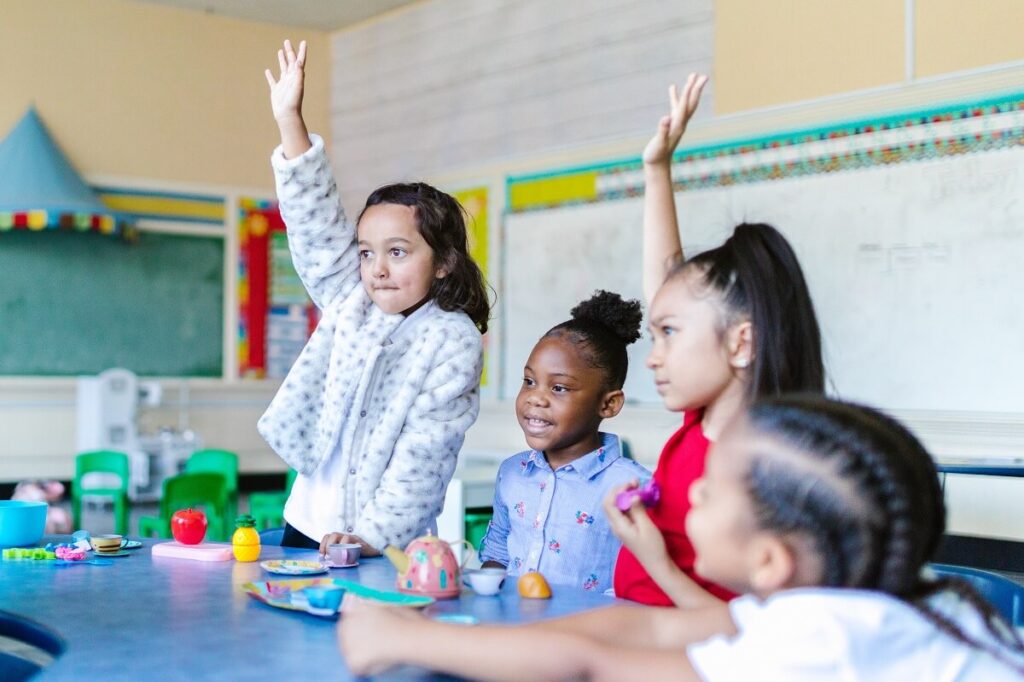
By and large, the goal of public schools is to impart information to students and then measure their retention through testing. While academics are certainly important, there’s a lot more to child development than simply filling their heads with rote data.
Montessori schools take a “whole child” approach to learning that observes not only academic progression but also physical, emotional, cognitive, and social aspects of development. This promotes overall well-being and helps to ensure that one area of growth isn’t the sole focus, at the expense of supporting healthy and well-rounded individuals.
One aspect of this approach is grouping children by developmental stages in multi-age classrooms where they enjoy a sense of community, engage in collaborative ways, and adopt leadership skills. How does this type of preschool environment contribute to more responsible children in the long run?
Nurturing Independence
The underlying principle of the Montessori Method is a balance between freedom and responsibility. With gentle guidance from adults, preschool children are allowed to self-direct learning within an age-appropriate curriculum. This helps to ensure that kids learn at their own pace and gain confidence in their decisions and interests along the way.
As students prove capability and responsibility, they are granted greater freedom, creating a self-sustaining cycle of growth that observes the needs of the whole child. Learning independence from a young age imbues children with real-world skills that help them not only in the classroom setting but in life.
Responsible behavior starts with the freedom to make choices, enjoy achievements, learn from mistakes, and gain confidence and independence. Montessori instructors guide, observe, and assist students as needed within a prepared environment, but students are encouraged to develop self-reliance from the time they enter Montessori preschool.
Encouraging Curiosity
As every parent knows, children are incredibly curious about the world around them. From the time they start crawling and take their first steps, they need constant supervision to keep them out of harm’s way.
While you need to keep them safe, you don’t want to stifle their natural curiosity, and this is where a whole-child approach to learning really pays off. With a focus on nurturing every aspect of development, a Montessori preschool program recognizes the importance of holistic growth in helping children reach their full potential.
When children are encouraged to explore their curiosity and interests, their natural proclivities are validated, helping them develop a sense of confidence and self-worth. This can contribute to feelings of positivity and excitement when taking on new challenges and responsibilities.
Supporting Leadership
One of the major benefits of an individualized approach to learning is that children are allowed to progress at their own pace. When paired with multi-age classrooms, students are allowed to observe what their peers are engaged in, even if activities are more advanced.
The flip side is that more advanced students can pass along their knowledge and skills to peers within their group, helping younger students advance as they’re ready.
Responsible behavior isn’t just about self-directed learning; it’s about developing the confidence to engage in leadership activities.
Setting Your Child Up for Success
A preschool environment that includes academic, physical, emotional, cognitive, and social development as part of a focus on the whole child provides a wonderful foundation for self-knowledge, confidence, and leadership, as well as responsible behavior.
Imparting these critical skills in preschool will set the stage for success throughout your child’s life, both academically and in real-world pursuits. Montessori programs are ideal for fostering a lifetime love of learning. Are you ready to enroll your child? Contact us today to get started.
